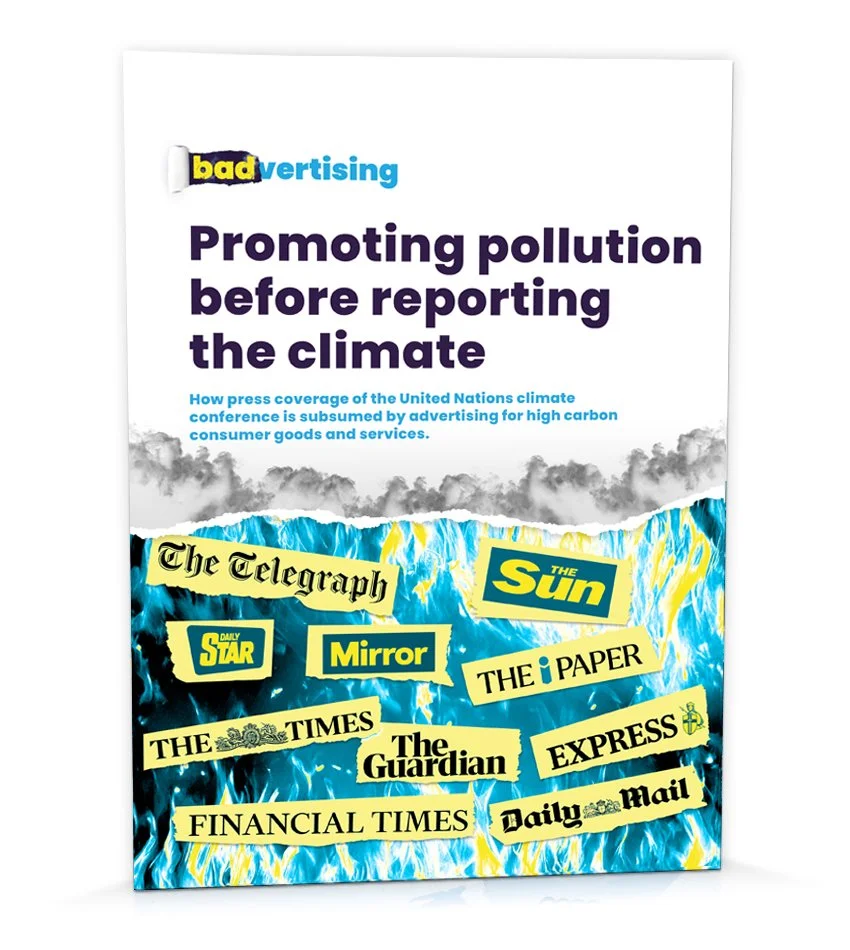UK newspapers gave more space to adverts for polluting travel than to reporting the climate crisis
New Weather Institute analysis reveals print media promoted high-carbon lifestyles during COP29 instead of covering climate action
As the world prepares for this year’s international climate talks — COP30 in Belém, Brazil, starting 10 November — new research by the New Weather Institute for the Badvertising campaign shows that UK newspapers are set to repeat a damaging pattern: promoting polluting travel and luxury consumption while under-reporting the climate emergency.
Our new report, Promoting Pollution Before Reporting The Climate, found that during COP29 in 2024, national newspapers gave more space to adverts for high-carbon travel than to their own coverage of the UN climate summit.
Across ten leading UK papers, advertising for flights, cruises and other forms of high-carbon travel filled 1,745 column inches, while coverage of the COP29 negotiations amounted to just 1,540 inches. When all ‘high-carbon’ advertising is included — covering airlines, carmakers, and fossil fuel-linked products — the total reached 5,086 inches, more than three times the space given to stories about climate negotiations.
“The science tells us that we must do everything possible to prevent catastrophic climate breakdown, but instead of discouraging climate pollution it is being actively promoted wherever you look, in ads for flights and big SUVs. Many climate challenges are hard, like changing energy systems and buildings, but it is easy to stop actively pushing high carbon, often luxury products and lifestyles.” - Andrew Simms, co-director of the New Weather Institute and founder of the Badvertising campaign.
Advertising pollution while reporting crisis
The study highlights a deep contradiction in UK media coverage. On pages where journalists warn of rising temperatures and record floods, readers are simultaneously urged to book long-haul holidays and buy gas-guzzling vehicles — the very products driving the crisis being reported.
During the two most significant days of COP29 in Baku, 32.6% of all paid adverts in UK national newspapers promoted high-carbon goods and services. Altogether, newspapers carried 19,379 inches of advertising — but devoted just 2.1% of editorial space to the climate conference.
The Financial Times was the only publication to carry no high-carbon travel advertising on the key COP29 days — and it also gave the most coverage to the talks.
“The public are being told by reporters that climate scientists are warning that we must stop burning fossil fuels, but those who still buy print newspapers are bombarded with adverts suggesting everyone else is enjoying long haul flights and luxury cruises.
“Newspaper proprietors and editors need to take their responsibilities more seriously, and act as though we are in a climate emergency.” - Brendan Montague, the report’s author and editor of The Ecologist.
The case for a ban on fossil fuel and high-carbon ads
The Badvertising campaign is calling on newspaper proprietors and editors to follow the lead of cities that have already ended fossil fuel advertising on sites they control, and to heed the call of UN Secretary-General António Guterres, who has urged media and tech companies to stop taking fossil fuel adverts altogether.
Advertising is one of the most powerful influences on public behaviour. The House of Lords In Our Hands report (2022) found that a third of the emissions cuts needed by 2035 must come from changes in travel, diet and home energy use. The report also stressed that “measures to regulate advertising of high-carbon and environmentally damaging products” will be necessary.
Yet UK newspapers continue to depend on the very adverts that undermine their own reporting and the global effort to avoid climate catastrophe.
A call for editorial integrity
The message from our research is clear:
you can’t claim to take the climate crisis seriously while selling space to promote pollution.
As the world turns its attention to COP30, we’re urging newspaper editors and owners to take responsibility, show leadership, and stop taking adverts that promote fossil fuel use and high-carbon lifestyles.
Because the climate crisis doesn’t need more column inches for cruise deals - it needs courage, consistency, and honest communication.

